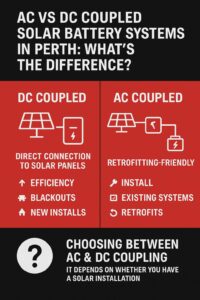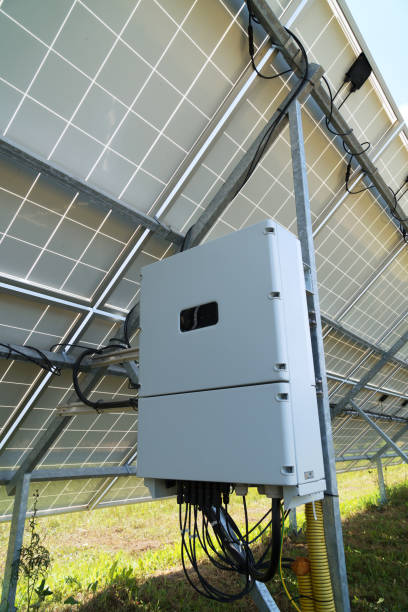As demand for residential energy independence continues to grow, Perth homeowners are increasingly turning to solar battery systems. However, a common point of confusion is the difference between AC coupled and DC coupled systems. Understanding this distinction is critical for selecting the most suitable solution based on your existing setup, energy usage patterns, and budget.
What Is a Coupled Solar Battery System?
A coupled solar battery system refers to how your solar panels, inverters, and battery storage connect. These systems are either AC (alternating current) or DC (direct current) coupled, and each has specific characteristics that affect efficiency, compatibility, and performance.
DC Coupled Systems: Direct Connection to Solar Panels
How It Works:
In DC coupled systems, the solar panels send DC electricity directly to the battery before being converted to AC power for household use via a single inverter.
Best Suited For:
New solar installations, where the entire system—solar panels, inverter, and battery—is designed and installed at the same time.
Advantages:
- Higher overall efficiency due to fewer energy conversions.
- Cost-effective in new setups as only one inverter is needed.
- Better performance during blackouts (when paired with a hybrid inverter).
Considerations:
- More complex installation process.
- Less flexible if retrofitting to an existing solar system.
AC Coupled Systems: Retrofitting-Friendly
How It Works:
AC coupled systems use two inverters—one for the solar panels and one for the battery. The DC power from the panels is converted to AC by the solar inverter, then reconverted to DC by the battery inverter for storage, and once again to AC for use.
Best Suited For:
Retrofitting a battery to an existing solar system.
Advantages:
- Easier and faster to install on existing systems.
- Compatible with a wider range of solar inverters.
- Independent battery and solar operations for improved system redundancy.
Considerations:
- Slightly lower efficiency due to multiple power conversions.
- May cost more upfront due to the second inverter.

Which Option Is Best for Perth Homes?
Choosing between AC and DC coupled solar battery systems depends largely on whether you already have a solar installation. For those with existing systems, AC coupling offers a practical upgrade path. For new builds or full system replacements, DC coupling offers greater efficiency and long-term value.
Professional Guidance Is Essential
With varying energy needs, inverter compatibility, and system design considerations, it’s essential to consult with a local solar Electrician experienced in solar battery installation in Perth. They can assess your home’s energy usage, panel setup, and backup power requirements to design a solution aligned with your goals.
Conclusion
Understanding the difference between AC and DC coupled systems is vital when investing in solar energy storage. Whether you’re planning a retrofit or a brand-new solar array, both options have their place depending on the context of your home and energy objectives. For end-to-end support, from system design to installation, speak with a provider specialising in solar installations Perth to make an informed decision backed by local expertise.

